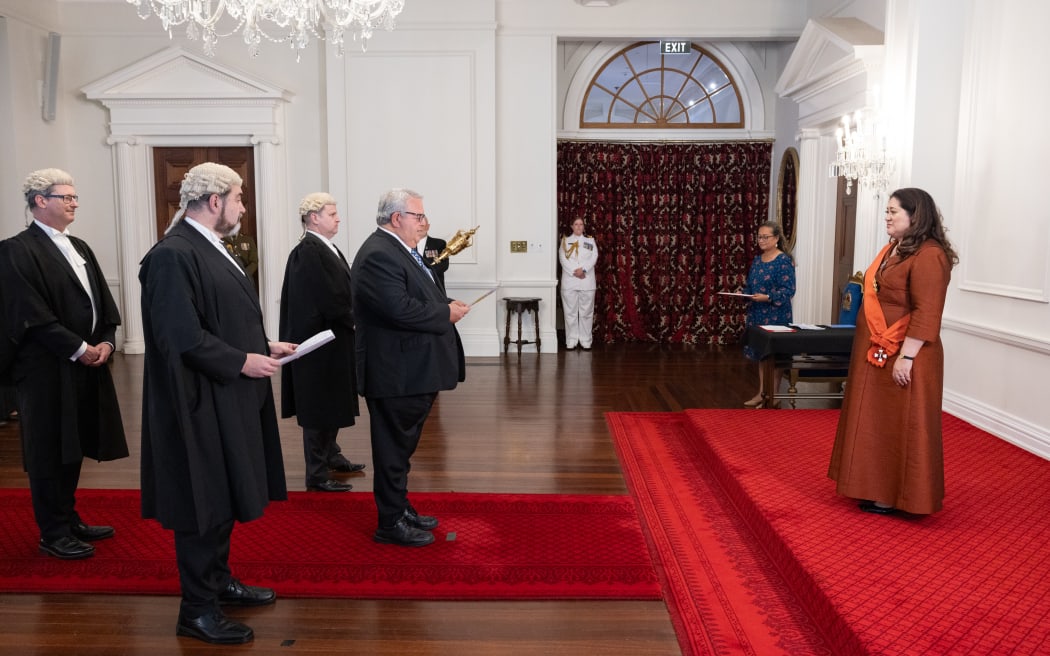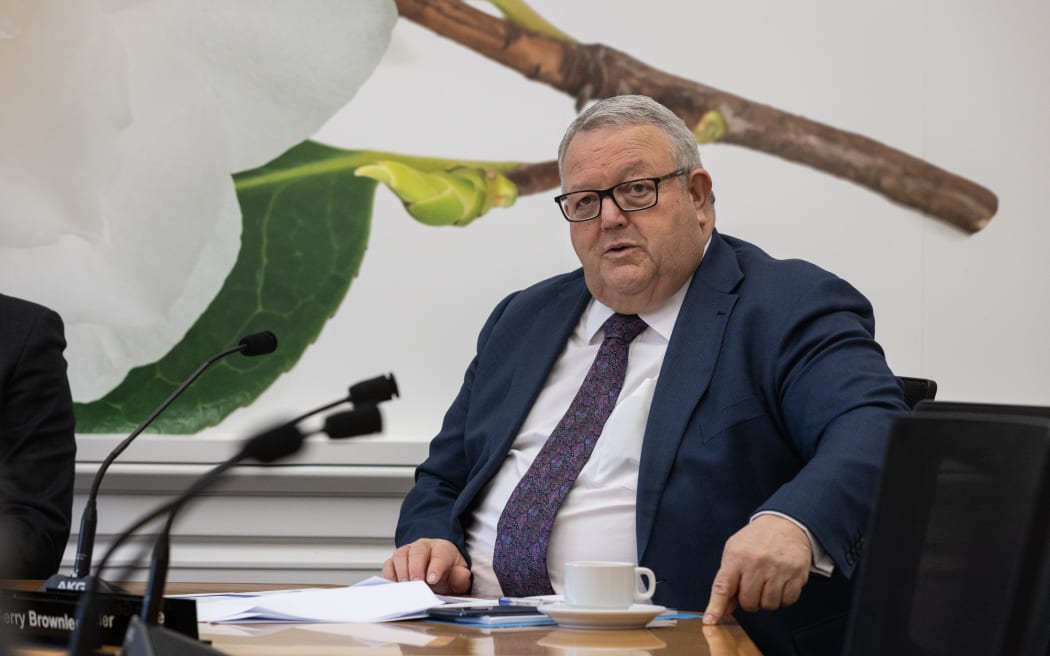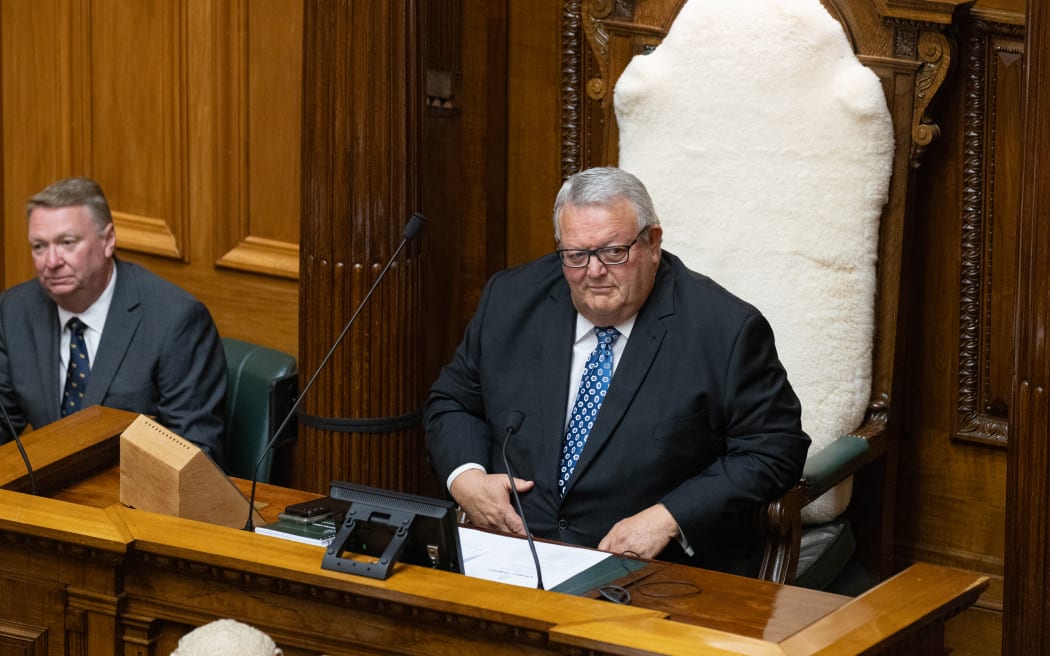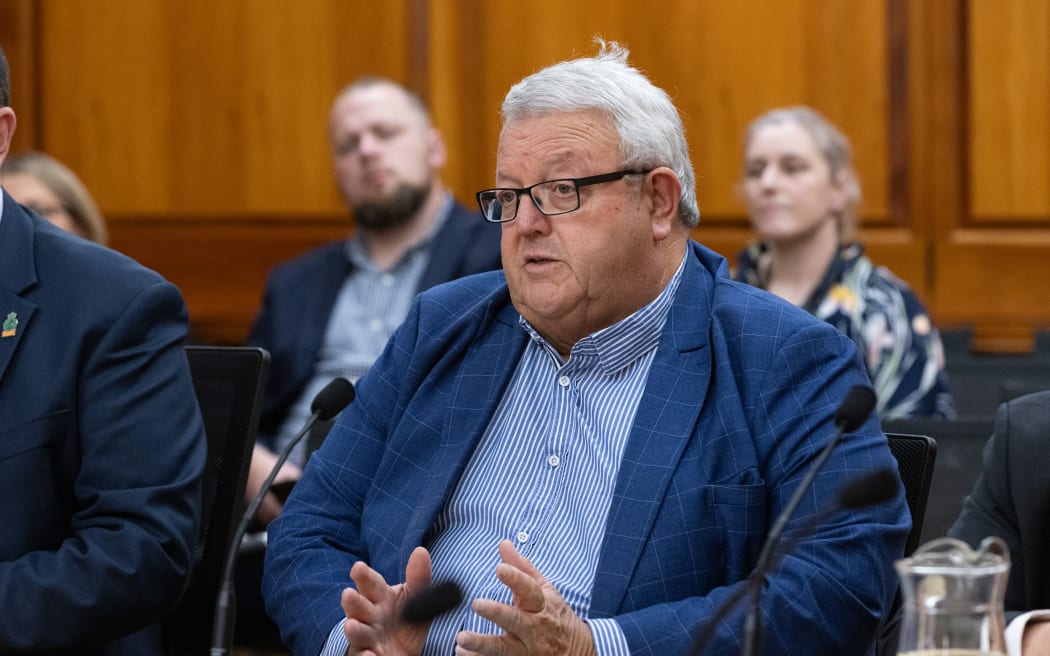The role of Parliament's Speaker is ranked fourth in the nation's Order of Precedence, comes with the title 'Right Honourable' (if you like that sort of thing), and shepherds the crucial institution of Parliament. But it seldom seems to be the first choice for MPs chosen for it.
Most speakers seem to have other plans. Adrian Rurawhe said he was looking forward to being a Whip when Chris Hipkins (then Leader of the House), "played the Jacinda Card" and elbowed him into being Deputy Speaker.
John Key gave David Carter a week to think about it, but as David Carter said, "it's not career enhancing to actually say no". In a barbed response to carping from Winston Peters, the current speaker Gerry Brownlee offered his job to the foreign minister. "You seem to know more about my job and I certainly know a lot more about yours. Do you wanna swap?"

Gerry Brownlee being formally sworn in as Speaker by the Governor General, Dame Cindy Kiro. Photo: VNP / Phil Smith
Eventually though, all speakers seem to settle into the unusual and multi-layered role. It goes far beyond wrangling testy MPs. Brownlee estimates that aspect is only about 20 percent of the role. The Speaker is also Parliament's figurehead, its landlord, the minister responsible for Parliament's three Officers (the Ombudsman, Auditor General and Commissioner for the Environment); as well as minister or nominal minister for the agencies that actually run the institution of Parliament.
It's no small role.
Stepping aside from the partisan and the team
The current speaker is longstanding National MP from Christchurch, and the current 'Father of the House', Gerry Brownlee.
When I sat down with him, I began by asking whether he is "enjoying" it so far. He instead outlined the importance of the role in ensuring good law-making, and fairness to all parties in all aspects of Parliament's business.
"That can be challenging, because you know, you're coming off 27 years of partisan politics to suddenly be 'Parliament's man'. But I think, probably because of those 27 years, you do have a greater appreciation of the importance of that fairness and the delivery of Parliamentary procedure."
One of the downsides that David Carter identified was having to remain at arms length from one's long-time party colleagues, so no longer feeling like part of the team.
Brownlee agrees.
"I think that is hard, because you form strong bonds with your own team, your own caucus, and you simply can't have the same interaction with them that you used to have. And so that is odd."
He mused that it would be easier to be entirely out of politics.
"But here in this role, you're observing the process of politics day-in day-out and your mind is a little bit in that zone. So it takes a bit of work to get yourself into that neutral position."
I liken it to a boxer-turned-umpire still standing in the ring but no longer allowed to swing any punches.
"It's probably an unfortunate sort of analogy, but it's a little bit like it. Yeah."
'Much more collegial'
In an earlier life Brownlee was a high school teacher. I ask whether there is truth in the common comparison, of the House as being like a fractious classroom. He doesn't think this analogy is sufficiently representative.
"What you see where the house is a little bit fractious from time to time, is just a snapshot inside a very long day… Question Time is only an hour. And the fractious bits inside Question Time are just minutes inside that hour. So not really the same."
He also believes that the impression the public gets from that burst of sound and fury gives an unfair impression of the MP's relationships.
"The basic respect that members have for each other is much deeper than the public might perceive just from watching those few minutes."
He is correct, the House at other times can have a very different feel. Committees even more so.
"Select committees are generally quite collegial. Even though people will be taking different views of how a piece of legislation should be constructed, it's a much more collegial process. And I think sometimes the bits that are not public are the bits where we see the greatest efforts being made by people to reach compromises or even agreement on stuff that they haven't previously agreed on. It's quite impressive. And it's …particularly gratifying because you can come away from those situations, knowing that you've done as good a job as possible on a piece of legislation, whether you're opposition or government."

Gerry Brownlee, while in opposition, serving as a member of a select committee. Photo: Phil Smith
Ruffling feathers, a safety valve
I ask whether he thinks the public focus that Question Time receives leads to worse behaviour, or whether MPs work better away from the glare.
"I think it's the difference between 'the theatre of the place' and 'the workplace of the place'," says Brownlee. "So, when you're in the workshop, if you like, the select committee room, you've got a job to do and get on with it; when you're in Question Time, where it's covered by radio, it's covered by television, it's more of an opportunity to, I suppose, display your feathers, then ruffle some others' feathers. That's just the way of it, the nature of it."
He says people worry and complain about that, but he thinks they needn't.
"We have a very safe democracy. We were one of the few (I think only four), that had full democracy, full franchise, …right through the last century. And when you think about the whole world, it's a pretty amazing sort of stat. We're a very young (post-1840) country, but one of the oldest democracies in the world. So we should be proud of that."
"I think the fact that we have, occasionally, those fractious moments in Parliament, it's like a relief valve, just blow the steam off, get over it and move on. …While it can be adversarial in a verbal sense, no way are we a country that's going to resort to some sort of a civil disturbance."

Gerry Brownlee in the hot seat. Photo: VNP / Phil Smith
Making rulings
When Speakers make rulings in the House they have three wells they can draw from: Parliament's many conventions, its rules (the Standing Orders), and the precedents derived from more than a century of previous speakers' rulings.
Every Speaker seems to comes at it differently and arrive in different places. I ask Gerry Brownlee whether he is feeling his way as he goes, or did he come with a particular approach.
"I think, my view right from the start is that the Parliament should have a flow to it, and a feel to it. So one of the things that I've stopped doing, (and a previous Speaker has done so as well), is calling members [by name] every time they speak… I think that it becomes more of a conversation, which I like to see."
He notes three things he is insisting on during Question Time:
- That questions are asked in absolute silence.
- That answers are not drowned out. "…You'll always get interjections. That's just the nature of it. A minister gets to be very broad and wide in how they answer, so you've got to expect that there'll be a little bit of pushback on some of those things, and I think that's appropriate."
- That answers aren't overtly political "…any political statements are taken right out of those primary questions… so for answers to come back with political statements is not acceptable, in my view, and I'm trying very much to stamp that out."
General primary questions
I note that he also appears to be trying to discourage general primary questions (e.g. 'Does he stand by all his party's policies and actions?')
He agrees that he is discouraging these.
It is quite a significant break from previous Speakers' rulings. Traditionally, those general primary questions allow a wide range of follow-up (supplementary) questions but can't expect specifics across that range. The opposite is true of specific primary questions. The supplementary questions have to stay within the narrower ambit of the primary, but can also demand more specifics from ministers.
Brownlee sees it differently.
"If the answer [to such a general question] is 'yes', where are we left to go? … The Standing Orders allow for supplementaries to elucidate on an answer. Well, 'yes' is pretty definitive… What's the next question? 'Did you mean yes, or did you not mean yes?'"
I attempt to counter that follow-up questions might probe for inconsistencies or specifics; but, Brownlee does not buy it.
"If you've put 'all actions, all statements' [in your primary question], it kind of drops dead at that point, in my view."
"…if the question sheet is going out for public information, which it is, then make it specific, don't try and use Question Time for that sort of 'gotcha' stuff. We'll leave that to the media - they're pretty good at that."
Side note: In a recent interview, Grant Robertson also said he preferred specific primaries, but he noted that if ministers avoid giving specific answers, opposition MPs will tend to retreat to general primary questions.
Demanding specifics
I ask Brownlee about the traditional demand for specificity in response to specific primary questions.
He recalls his experience as a minister of preparing to answer question in Question Time. "There's two-and-a-half hours to gather the information, so the expectation on those answers is quite high. But if it's just a general thing, it could be anything at all. 'Does the minister stand by all his or her statements and actions?' You can't expect a minister to have detail about absolutely everything that will be coming across the desk, because there's just so much of it."
I ask what having long experience as a minister brings to the role.
He notes that the experience of preparation tells him what ministers should know and be able to answer.
"I kind of expect that of all ministers, you know, the accountability platform. So you certainly have to know a lot about your own portfolios, which you should be questioned on. And if you're giving vague and general answers…"
He trails off and I offer… "it can look like the minister has got no idea what's going on in their portfolio."
"That's a judgement that others would make. I can't make that judgement. But… you asked me what goes through my head; that would be something similar to that, yeah."

Gerry Brownlee appearing before the Governance and Administration Committee this year in his role as the minister responsible for Parliament's main administrative bodies. Photo: VNP / Phil Smith
Responsible government
Is he a believer in responsible government and Parliamentary sovereignty; that the Parliament's job involves holding the government to account, asking tricky questions and getting the detail?
"I think governments shouldn't be in any way afraid of that. The answers that will be given to questions won't always please the person who's actually asking the question, but governments are elected, governments are put together, and governments have a right to govern. And so they shouldn't be afraid to say, 'Well, look, that's our policy. That's what we're doing. That's what we've got elected on. That's where we're going.' But they should be prepared to talk about that inside Parliament."
The lean Parliament, MMP and the three-year term
"I think we do have a very straightforward form of government in New Zealand, we don't have an upper house, we have a relatively simple process for changing laws or making new laws. And that's personally why I'm not in favour of a four-year term. I think if we had an upper house that might make sense, because you'd have another degree of scrutiny on everything a government is doing, but we don't and we shouldn't have because we're a small country. We should be lean. I don't think it's too much to expect that every three years you ask the voting public."
I note Geoffrey Palmer's description of the New Zealand's government's somewhat unfettered level of power.
He agrees but says that he doesn't think that power "is as much abused as some might imagine it is now. MMP has been quite a limiting factor on all of that. And that's another reason why I'm firmly a three-year term fan - expressing a political view here, that Speakers aren't meant to express."
I note that if there were a vote on such a change he will get to vote on it with every other MP.
"Absolutely."
Honourable porkies
In Parliament, every MP is presumed to be 'honourable'. Every MP must be taken at their word, because surely no honourable person would ever lie.
In reality the debating chamber is no stranger to highly selective statistics, half-truths, gaslighting, and alternative facts; but precedent forbids MPs from calling porkies out in the House. Doing so would be to impugn another MP's honour. It's something of a catch-22.
According to the rules an MP 'misleading the House' is a serious breach, but the precedence is that Speakers don't refer these kind of breaches to the Privileges Committee unless they are very serious.
I asked Gerry Brownlee about this problem area, referring to a recent ruling (7 May) from him during Question Time. Here is part of the Hansard record of the exchange:
Hon MARK MITCHELL: ...So the $1.9 billion investment was in capital and operating expenditure for a Corrections system that has received very little focus or attention from the previous government, who's only public safety target was to reduce the prison muster by 30 percent-
Rt Hon Chris Hipkins: Point of order, Speaker. The claim that the Minister keeps repeating-as a Minister-is wrong in fact and could only be interpreted as deliberately misleading the House… Well, he said it multiple times-that there was only one target of the previous government. Anyone picking up the Estimates documents will see that there are dozens of targets for Vote Corrections and that the claim the Minister is making is not true.
SPEAKER: And I'd ask the Minister to therefore refrain from making that statement.
Rt Hon Chris Hipkins: Point of order, Speaker. In fact, he needs to correct it-he has given misleading and incorrect information to the House repeatedly.
SPEAKER: Sorry, no you can't ask for that. In the end, it is a political exchange in here, and that is part of that. I can only adjudge the reasonableness of anyone's statements. But it would be unreasonable for me to say that because the Opposition says you're wrong, you must apologise or withdraw from it-that wouldn't be the way the place works.
I asked Brownlee to outline how this does work.
"I think the concept is that when people speak in the House, they speak from their perspective about what they believe, driven by their political principles, if you like. Sometimes questions arise, 'Well, is that a truthful statement or not?' The position always taken by the Speaker is that honourable members do present truthful positions to the House, and if someone thinks someone has misled the House, then there is a process in our standing orders to test that out. Otherwise, you'd have a situation where, you know, all day long people would be saying 'that's not true', and 'that's not true'. And 'he's got that wrong'. 'She's got that wrong.' 'Why'd she say that?' … And the Speaker would just be in an impossible position. And it would also mean that debate would, I think, degenerate into that sort of, 'he said, she said', type approach, which is not at all healthy."
I note that the Speaker would be stuck in the middle of that argument.
"I periodically get asked to rule on different people's interpretations of Standing Orders. So my general default position is to say, 'Look, I'll take a look at that and come back to you.'
Brownlee says he goes back and watches the bits of Question Time where it "flares up, just to see how it looks". Question Time doesn't just upset people inside the House, it seems almost guaranteed to anger those watching it on TV.
"I get a lot of letters from people saying that Parliament is rabbleous … they're generally complaining about specific parties. I think everyone's just got to draw a bit of breath and recognise it's a House of Representatives, and, you know, people will present themselves in different ways. And there will be those, fire up, verbal explosions between people. But they've got to see it in the context of a vibrant democracy that has basic respect for all of those who participate in it. I think it's very important."


